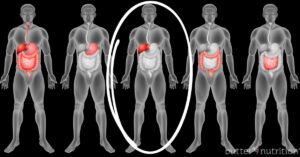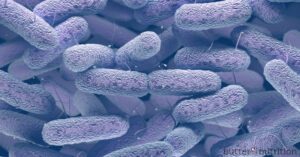 Dairy has been both glorified and demonized a lot in the last decade, earning a number of labels including inflammatory, mucus producing, and fattening. However, is it an issue with the kind of dairy, or does the problem lie in the body you're putting it into? How can a natural, whole food that has nourished generations be so problematic and cause issues such as food allergies and lactose intolerance?
Dairy has been both glorified and demonized a lot in the last decade, earning a number of labels including inflammatory, mucus producing, and fattening. However, is it an issue with the kind of dairy, or does the problem lie in the body you're putting it into? How can a natural, whole food that has nourished generations be so problematic and cause issues such as food allergies and lactose intolerance?
Why might you be sensitive? Here's my top 5 reasons...
1) Vitamin A toxicity
While dairy isn't inherently bad, overexposure for decades can be. You see, dairy products are incredibly rich in fat-soluble vitamins, which are subject to toxicity. You can't just pee them out when you get too much (like water-soluble vitamins), they are stored in tissues. Vitamin A levels can creep up in persons overdoing dairy and/or other sources of vitamin A (think supplements, eggs, butter, liver, etc.) and excess is stored in the liver.
I often see excess vitamin A accumulations in those who feel like dairy makes them gain weight.
Sometimes when you don't feel good after eating a food, it might be your body communicating to you that it doesn't need the nutrients and they could actually be stressing out your liver. Read more on vitamin A toxicity and how to test for it here.
2) Dairy can be problematic to digest
If you have nutritional deficiencies, nutritional excess, liver-gut issues and a slowed metabolism, you probably have weak digestive juices that don't allow you to digest your food properly.
This can set the stage for lactose intolerance, which just means you don't produce enough lactase, the enzyme needed to digest the sugar in milk.
For these people, low lactose dairy can be a better choice, like that found in firmer cheeses, dry curd cottage cheese, and lactose-free daily products.
3) Dairy products have changed over the years in negative ways
Most (not all) dairy comes from unhealthy factory farm cattle. This often means the cow was fed an unnatural diet, not allowed free movement or sunlight, and treated with antibiotics and hormones. All these factors can make the milk MORE allergenic and LESS friendly to your body. Sometimes just choosing a different sourcing or brand can make all the difference. According to Dr. Ray Peat, PhD, "People who have told me that they have had digestive problems with milk have sometimes found that a different brand of milk doesn't cause any problem."
Another huge factor to consider is the kind of milk you are drinking. According to Motherjones.com "An emerging body of research suggests that many of the 1 in 4 Americans who exhibit symptoms of lactose intolerance could instead be unable to digest A1, a protein most often found in milk from the high-producing Holstein cows favored by American and some European industrial dairies. The A1 protein is much less prevalent in milk from Jersey, Guernsey, and most Asian and African cow breeds, where, instead, the A2 protein predominates."
Because of the way A1 milk is broken down, it's more likely to be a problem for those with poor health or gut issues, where as making the switch to A2 milk may not be necessary for healthy individuals. According to Dr. Thomas Cowan, "One saving grace, as expressed in Devil in the Milk, is that the absorption of BCM 7 is much lower in people with a healthy GI tract. This also parallels the ideas of the GAPS theory which expounds upon this topic. BCM 7 is also not found in goat's or sheep's milk, so these types of milk might be better tolerated by those with a compromised digestive system." For anyone suffering from lactose intolerance or inflammatory diseases (autoimmunity, Rheumatoid arthritis, etc.) as well as autism, and diabetes, a trial swap is a very worthwhile idea.
A2 dairy products are those that come from goats, sheep, humans, about 65% of Jersey cows, and a few other varieties. Milk that is considered to be A2 dairy is NOT the traditional cow milk that you'll find at your local grocery store. Traditional cow milk is what you call A1 dairy, commonly from a breed of cows called Holsteins, the most common dairy-cow breed you'll find in the US.
4) Added vitamins and additives
Reduced fat and fat-free milks require synthetic vitamins to be added back in because vitamins A and D are found in the fat of the milk. According to Dr. Peat, "Milk with reduced fat content is required by US law to have vitamins D and A added. The vehicle used in the vitamin preparation, and the industrial contaminants in the "pure" vitamins themselves, are possible sources of allergens in commercial milk, so whole milk is the most likely to be free of allergens."
Added synthetic vitamins can contribute to things like vitamin A toxicity, and could result in a poor response to dairy consumption.
Some brands of milk contain additives and gums such as carrageenan that are known to cause GI irritation. In addition, 90% of North American Cheese is made with GMO derived rennet.
5) Hormonal imbalance
Hormonal imbalance conditions such as progesterone deficiency and excess estrogen can actually allow you to lose the ability to produce lactase (ie. become lactose intolerance). Lactase is the enzyme needed to digest the sugar in milk. This can produce symptoms such as diarrhea, constipation, bloating, gas and more severe distress for some, such as a "shards of glass" feeling in the intestines. Not fun!
Benefits of dairy:
- Dairy is a true nutritional powerhouse. What other food gives you protein, carbohydrates, and fat in one single food that requires no cooking?
- Milk contains very high quality protein.
- Contains low levels of iron (iron build-up can lead to increased inflammation).
- Dairy is high in calcium and can have a significant "anti-stress" effect on the body (maybe a hint to why stress can trigger ice cream cravings?).
If dietary calcium isn't sufficient, causing blood calcium to decrease, the PTH increases, and removes calcium from bones to maintain a normal amount in the blood. PTH has many other effects, contributing to inflammation, calcification of soft tissues, and decreased respiratory energy production." Dr. Ray Peat, PhD.
Trouble in paradise: Is it lactose intolerance or a casein sensitivity that's bugging you?
- If you find that you can tolerate hard-aged cheeses (firm cheddar, Asiago or Parmesan) but you have digestive issues with milk and ice cream, this is a key indicator that you are having a problem digesting lactose (the sugar in milk). If this is so, seek out lactose-free dairy options: such as lactose-free yogurt, sour cream, cottage cheese, and firm cheeses, while you work on up-regulating your digestive juices to tolerate lactose again.
- A casein sensitivity is the other thing to look out for. Casein is the protein in milk, and there are a wide variety of symptoms that can result. Look out for symptoms that appear to be triggering your body's stress response.
Tips for incorporating dairy (if you are sensitive or lactose intolerant)
- If you are sensitive to the casein in dairy, you need to eliminate it for a period of time, while you work on strengthening your digestive environment.
- If you have trouble digesting lactose, it's best to avoid it while strengthening your digestive environment and focus on up-regulating digestive juices. Sometimes after working with a nutritionist on your digestion, you can reintroduce lactose after a period of time without any issues, although this often can take up to 6-12 months or more. In the meantime, here's a few tips to aid you in experimenting to find your level of tolerance:
- Give raw goats milk or A2 dairy products a try. They are easier on your stomach.
- Try aged goat and cow cheeses, such as Parmesan, which has virtually zero lactose. The longer the cheese is aged, the less lactose, so think aged cheddar and other firm cheeses.
- Test out your reaction to homemade kefir and lactose-free products: yogurt, sour cream and dry curd cottage cheese to get the nutritional benefits without the digestive distress.
Tips for reintroduction:
After avoiding it for a period of time, go slow when you start reintroducing:
- Start with a small amount of Parmesan, since it is typically made with animal rennet and contains virtually no lactose.
- If that goes okay, try small amounts of clean, lactose-containing cheeses such as mascarpone and ricotta.
- Finally, introduce a small amount of milk (1-2 oz. /day) for a few weeks and slowly increase. A little milk in your coffee each day is a great way to try this.
When a group of lactase deficient people have been given some milk every day for a few weeks, they have adapted, for example with tests showing that much less hydrogen gas was produced from lactose by intestinal bacteria after they had adapted," Dr. Ray Peat, PhD.
If you don't like dairy or it doesn't work for you at all, that's okay too. Everyone is different, and it's important to understand that this is not a one-plan-fits-all kind of thing. Experiment and see what works best for you!
Do you have a dairy sensitivity or have lactose intolerance? Please share in the comments!
PIN IT:
References:
Peat, Ray. Milk in context: allergies, ecology, and some myths. 2011. Retrieved on November 17, 2012 from http://raypeat.com/articles/articles/milk.shtml
http://www.motherjones.com/environment/2014/03/a1-milk-a2-milk-america






Carey Huyser says
For those of us who have a sensitivity to whey or casein, can we also reintroduce milk slowly after a non-dairy period of time?
Volume says
Hey
Me too! I am allergic to Casein! How can i heal this allergy 🙂 Or which dairy foods are lowest in Casein because i am nuts about dairy
Helios Farms says
All of these problems are caused by pasteurized milk. All of these issues are solved with clean, raw milk from grass-fed cows.
See http://www.realmilk.com/ for more info. I couldn't drink milk for 45 years, until I got my own cow. Now we have a raw milk dairy, and are seeing the health benefits in so many families. There is zero nutritional value in heat-treated milk. That was an 18th century solution to an 18th century sanitation and feed problem.
Sandi says
Hmmm... My issues aren't addressed with this article. I eat very clean... Raw organic dairy, local organic grass-fed meat, grow much of my own organic veggies, etc. About a year ago I became dramatically allergic to casein, even if I hold milk or yogurt in my mouth it starts itching and if I swallow it I will start wheezing and coughing, with my throat and chest producing tons of mucus. All cow's milk products cause the same reaction, including organic cheeses and butter, but I have no issues with goat or sheep milk cheeses. This is not a lactose issue. I feel it would be very foolish to ever try to reintroduce any cows milk to my diet.
Sandi says
Follow up to my previous comment... does the author EVER look at the comments and respond? I sure would like some feedback toher than "Your problem is conventional dairy"!
Sam says
Sandi:
I can have goat and sheep's milk products as well! Parmasean is the worst aged-cheese for me. Even lactose free cheese does not help.
Helios Farms says
What happened to my comment? It was awaiting 'moderation'. I'll try again:
All of these problems are caused by pasteurized milk. All of these issues are solved with clean, raw milk from grass-fed cows.
See http://www.realmilk.com/ for more info. I couldn’t drink milk for 45 years, until I got my own cow. Now we have a raw milk dairy, and are seeing the health benefits in so many families. There is zero nutritional value in heat-treated milk. That was an 18th century solution to an 18th century sanitation and feed problem.
Geetu says
I am absolutely fine with dairy apart from sweet cream or ice cream which gives me terrible IBS described above in the 5th note
Nichole says
milk is hormone/antibiotic dowsed garbage. it is there for a baby calf to become big fat cow and we wonder why there's an obesity epidemic in our country. maybe there's a reason why people can't drink it.
Helios Farms says
Try fresh, raw milk from a small, grassfed dairy. See http://www.realmilk.com for more info. There you can also find a small dairy in your area using their 'milk finder'. Support small farmers producing real food 🙂
Sarah says
Right on! Someone finally has nailed it! This blog is pretty onviously trying to stay on the side of dairy. But if you look into the dairy industry and the way these poor cows are treated, you'll never want more milk or ice cream. Switch to coconut milk ice cream or hemp, but god, not soy, another problematic "product" but not an actual food. Dairy is acidic and mucous causing. It is a detrement to the body each and every time it is consumed, something the body has to work hard to get rid of because it is definitelt NOTnutritious, no matter what these people who support mega industrial dairy farming are telling you.. Look around on the internet and educate yourself away from dairy products. They are unnatural and non nutritious and cause all sorts of GI issues as well as emotional and mental symptoms, like depression. Best of all, you can remove it from your diet, and watch for improvements, add a bunch back in and watch for all the symptoms to flood back. Elimination diet. Try it.
Denise says
I've noticed lately that I've had these spells of sadness and tears. Yes I've had a lot going on in my life, but I'm typically level-headed and motivated. I recently started using regular organic milk in my morning lattes this past week. I'm wondering if there is any correlation.
Rachael @ Love Yourself Green says
I'd love to be able to eat cow's dairy again once in awhile. As some of the other commenters have asked - is that possible? I just became allergic to dairy in 2012 due to Leaky Gut - I had nutritional deficiencies and didn't even know it... but my hair was falling out and my docs really should've been able to put two and two together for me based upon my symptoms. I'm much healthier now, though - I eat an all organic diet and have cut out all junk and gluten/grains/wheat and legumes. Doing quite well now - still missing regular cheese once in awhile though...
Thanks for the great article! 🙂
Joyce says
I had allergy symptoms of congestion in sinus and lungs after dairy. Gave it up 3 years,ago. Eat grass fed beef and generally improved my health with mostly whole foods, lots if organics and found I could have grass fed butter on my veggies. Lost 40 lbs. Now 3 years later I am trying imported cheeses and had some yogurt, all not causing problems! I am trying goat and sheep cheeses and can't believe it but having no reactions. My allergy seems to be gone.
Shirley Bauman says
I don't know if anyone will read this as it's some time since this article was written, but here goes! Try milk from one of the older breeds of cows e.g. Jersey, Guernsey. They produce A2 milk. It makes the protein different I forget the details.. See "The Devil's in the Milk" and do a search for an article on A2 by Snowville Creamery. Goats milk is A2. Milk from Holstein cows has the A1 gene and that seems to be problematic even if they are grassfed. All the best everyone!
Louise says
Thank you for this information. My gastro doctor told me that I don't have an allergy to dairy. That MAYBE I have an 'intolerance' to dairy, but not an 'allergy'. All I know is it makes me sick when I have dairy - milk, cheeses, ice cream. But oddly I can eat plain Greek yogurt - in moderation - and not suffer too much. I will do research on A2 milk and also check out Helios Farms and http://www.realmilk.com/ to find a raw milk local dairy. Though it's been some time since your post I just came across it and am glad I did.
greek yogurt
Krystal says
I only consume raw milk and don't have any reactions to dairy other than increased mucus production, is that normal or does that mean I have a sensitivity to it and should avoid it?
sandy says
If casein is the problem, finding Guernsey A2/A2 milk may help. It's a different protein and some people tolerate it much more easily.
Claire says
Love a great many of your articles but dairy?? Nope. Cow's milk is for calves. It is a baby food and weaned means no more milk. We do not need it. Digestive enzyme for dealing with lactose starts to drop age 4 and is virtually gone by age 7. The natural age for human weaning from the mother is around 4 to 7 yrs. After human milk we don't need anymore milk.
Panait Ciprian says
this is a lie. the milk for calves is different and has a bad taste to humans. But a cow produces milk continnuosly. what you said is a lie from people that never drank real milk.
Sarah says
Cows only produce milk continuously because we force them too with constant milking. Cows have been enginneered by us to produce much much more milk than they would for one calf. This is not nature. Educate.
haydnikki says
Thank you! People need education. It really should make sense when you’re introduced to the notion. I remember hearing this at a lecture in college 20years ago and I haven’t drank regular milk since then. I haven’t been able to completely drop cheese though 🥴 it’s been a weakness, lol.
Marie Coe says
I have a kid who has issues with dairy. Tests negative for allergies I hear rumor he does produce lactase. Ask me not enough. However if you even feed this kid anything with normal milk his tummy hurts. Give him lactose free stuff he is fine. Bake the items with his 2 percent lactose free milk he is fine. WTH???? How do you find the cow source of milk?
Sarah says
Your tests are the tests that matter. Not the doctor's allergy test. I think you have your answer based on what your child is telling you.
Stefan says
I read the title as "wheat to do about it". The irony
Linda says
I was tested with a blood sample and told I am sensitive to whey and told to stay away from all dairy, including that from goats because it all contains whey. Yet when I do have dairy, I have no reactions at all. I find it hard to believe that I'm really sensitive to it, but was told after testing on two occasions that this is the case. What to believe?
Leon says
I can not consume any food containing regular milk without experiencing flatulence, or diarrhea. I initially thought that I had a lactose problem. When I drink lactose .free milk I do not have digestive problems. I accidentally consumed some organic ice cream and did not have any digestive problems. I bought a half gallon of organic milk consumed it and did not have any digestive problems. I now purchase only organic milk and ice cream and do not have any digestive problems by consuming either. I still have digestive problems with any product containing regular milk.
SB says
I turned lactose intolerant at the age of 18 through hormonal changes (doctors never thought of after numerous testing, I self diagnosed after a year of pain). At the same time I also turned allergic to metals (earrings/bracelets) except gold. The reason that I now know it's related to my hormones is because while I was recently pregnant (3 miscarriages) I could eat any and all dairy I wanted and digest it just fine!! It's been a struggle to miscarry and then go back to a lactose-free diet back and forth. 🙁 I was hoping that after I got pregnant things might change - they haven't yet! Thank you for the wonderful article.